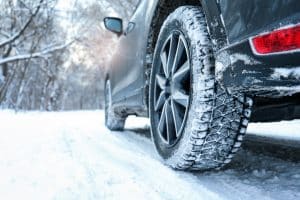Traveling Outside Chicago? Be Careful of Farmland Terrain
 During a winter storm in DeKalb County, approximately 65 miles from Chicago, a car slid off the slippery roadway at the junction of Somonauk and Gurler roads. The vehicle ended up upside-down in a flooded ditch, near a culvert with snow covering the ground. Despite the challenging circumstances, the driver managed to call for help, and fortunately, a county sheriff’s deputy was nearby and heard the call. DeKalb County Chief Deputy Sheriff Jim Burgh reported that the water quickly filled the car, reaching the man’s shoulders, but he remained conscious.
During a winter storm in DeKalb County, approximately 65 miles from Chicago, a car slid off the slippery roadway at the junction of Somonauk and Gurler roads. The vehicle ended up upside-down in a flooded ditch, near a culvert with snow covering the ground. Despite the challenging circumstances, the driver managed to call for help, and fortunately, a county sheriff’s deputy was nearby and heard the call. DeKalb County Chief Deputy Sheriff Jim Burgh reported that the water quickly filled the car, reaching the man’s shoulders, but he remained conscious.
This sort of scenario may not be one you see every day in the city, but it’s not uncommon once you leave Chicago and begin venturing into the countryside. Even the suburbs pose a different set of risks on the road. So rather than focus on the more common tragedies we face every day – hit-and-runs, pedestrian accidents, CTA bus accidents, and so forth – we want to talk a bit about the risks you face when you travel to more rural areas.
What to do if you find yourself in submerged vehicle
If you find yourself upside down in a ditch that’s filling up with water, or if you’ve crashed into a lake or canal, it’s crucial to stay calm and act quickly. Here are steps you should take if you find yourself in a submerged vehicle:
- Unbuckle your seatbelt. If you can reach your seatbelt release, unbuckle it. If the seatbelt is stuck, use a knife or any sharp object to cut yourself free.
- Note: If you haven’t purchased a glass and seat belt cutter, you should. Most hardware stores carry them, and so do big box stores.
- Exit through a window. Try to exit the vehicle through a window. Car windows are designed to be easily broken in emergencies. Use a window breaker tool, your foot, or any heavy object to break the glass.
- Note: Break the windows, not the windshield. Windshields are made of a different type of glass and are designed NOT to shatter on impact.
- Swim to the surface. Once outside the vehicle, swim to the surface. If the vehicle is sinking, swim away from it to avoid getting pulled down.
- Note: If you can’t swim to safety immediately, float on your back to conserve energy and wait for help.
- Call for help. If possible, call for help immediately. Use a phone if it’s accessible, or scream for assistance if there are people nearby.
What other dangers do rural roads pose?
Rural roads pose specific challenges and risks that contribute to their reputation for being dangerous. For example, Illinois has a fair number of gravel roads and dirt roads (including in Chicago proper). Even if the road itself is perfectly safe, drivers who don’t have experience on these types of roads may find themselves in some trouble – especially if there’s bad weather. Several other factors that contribute to the heightened risks on rural roads include:
- Limited infrastructure and safety measures. Many rural roads lack the infrastructure and safety features found on urban or suburban roads. The absence of adequate lighting, road signs, and markings can make navigation challenging, especially at night.
- Road design. Rural roads often have narrower lanes and may be winding, making it difficult for drivers to anticipate turns and changes in the road. Limited visibility can increase the likelihood of accidents, particularly on unfamiliar routes.
- High speed limits. Some rural roads have higher speed limits, and drivers may feel inclined to travel at higher speeds due to lower traffic density. This can lead to more severe accidents when collisions occur.
- Limited law enforcement presence: Rural areas may have fewer law enforcement officers patrolling roads, resulting in less immediate response to accidents and potentially lower adherence to traffic laws.
- Wildlife crossing. Rural areas are more likely to have wildlife crossing roads, increasing the risk of collisions between vehicles and animals. These incidents can result in sudden stops or swerves, leading to accidents.
- Poor road conditions. Rural roads often suffer from inadequate maintenance, leading to potholes and uneven surfaces. Poor road conditions can contribute to loss of control and accidents.
- Longer emergency response times. Emergency services can take longer to reach accident sites in rural areas due to the distances involved. This delay can impact the timely treatment of injuries and the overall outcome of the accident.
- Limited access to medical facilities. Rural areas may have limited access to medical facilities, which can affect the prompt treatment of injuries. Longer distances to hospitals can result in delayed medical care for accident victims.
- Weather conditions: Rural areas may experience harsher weather conditions, including snow, ice, and fog. Inclement weather can further complicate driving, increasing the risk of accidents. While Chicago may have its roads salted, many countryside roads do not.
- Inadequate signage and warning systems. The lack of proper signage and warning systems for potential hazards, such as curves, intersections, and sudden changes in road conditions, can catch drivers off guard.
- Agricultural vehicles. Rural areas often have a significant presence of agricultural vehicles, which may move at slower speeds and share the road with other vehicles. Negotiating the presence of large, slow-moving equipment can pose challenges.
Understanding these factors is crucial for drivers on rural roads to exercise caution, adhere to speed limits, and remain vigilant. The driver from the news article who found himself in a culvert was lucky that a Sheriff had been nearby, or he might not have survived the incident at all. That’s why it’s important that if you are planning on driving on unfamiliar, rural roads, you understand the associated risks.
At Gainsberg Law, we handle all manner of car accidents, no matter what kind of road you were travelling on at the time. We also have experience suing the City of Chicago, so if your crash was the result of poor road maintenance, design, or planning by a municipality, we can help. To schedule a free consultation with an experienced Chicago car accident lawyer, call us or fill out our contact form. Proudly serving the entire Chicagoland area and beyond.

Attorney Neal Gainsberg has spent the last 20+ years fighting to protect the rights of the injured in Chicago and throughout Illinois. For dedicated legal help with a personal injury, car accident, or wrongful death matter, contact Gainsberg Injury and Accident Lawyers in Chicago for a free consultation.
